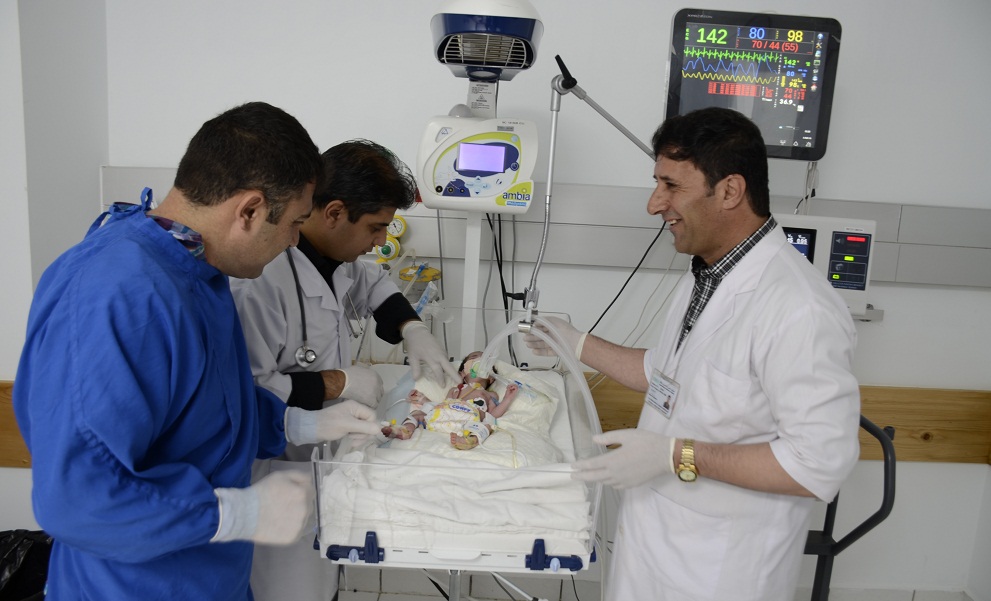On August 1, 2015, a pair of conjoined twins were successfully separated by a team of local Afghan doctors at French Medical Institute for Children in Kabul, Afghanistan. The team was led by Dr Jalil Wardak, Head of Paediatric Surgery at the hospital. The two little girls, named Ayesha and Sidiqa will return to Shahr-e-Buzurg after 15 days and will begin a new chapter in their lives. The conjoined twins were successfully separated after a surgical operation over five hours with a team of more than five doctors and four nurses.
This was the first successful case of separating conjoined twins connected in medical history of Afghanistan. The achievement was a collaborative effort of all paediatric surgical team. With great love, the suffering of the conjoined twins and their parents was relieved.
“From the very beginning, I have been worried that this might be a dream. When I saw my two dear daughters sleeping in two separated beds peacefully; I realized that my dream has come true” said Mahgul, mother of the twins.
Mahgul lives in Shahr-e-Buzurg district of Badakhsha province with her husband Haidar Mohammad. The family of 11 is mainly supported by Haider’s income. His monthly income of 7000 Afghanis has to pay for the living expenses of entire family. Mahgul had a home delivery by a village woman and found out that she had twin girls, unfortunately conjoined. Haider took her to the provisional hospital in Faizabad to give her good care. Realizing the case is critical and complicated, doctors at Faizabad hospital consulted through telemedicine with Dr. Jalil Wardak at Kabul. Both teams agreed to refer the patient to FMIC sooner the better. Considering the case severity and family’s financial condition, FMIC also agreed to provide treatment free of cost to family, through its patient welfare programme.
Haidar Mohammad said, “I used to believe that if you do not have money, you may not get good medical care and Ayesha and Sidiqa will have no future. But the hospital in Kabul (FMIC) told me to not worry about money, but to think about how to take care of our twin daughters later on when they will be healthy.”
The family with the twins reached FMIC hospital and the twins were immediately admitted and went through a number of investigations, tests and expert opinions from surgery, aneasthesia and radiology departments. Dr Wardak and his team concluded high hopes for a successful operation. The operation itself lasted 5 hours. The twins were partially connected at the abdomen and genital area and with great expertise were successfully separated from each other.
The further treatment and great care of the twins will now be required, which need further stay of the twins at the hospital ICU till they are healthy enough to be discharged. This ground breaking achievement is the result of concerted team effort, carried out with great love and dedication of a team of Afghan doctors and nurses.
“I am optimistic about their future, all parameters are excellent, God willingly they will have a healthy life ahead. This was a complicated case, but we discovered that they are girls and not boys so his father has renamed them; now one is Ayesha and other is Sidiqa”, said Dr Wardak. “I am proud of our team, who has done a wonderful job. It is good to give smiles to others, that is what we try to do here at FMIC,” concluded Dr Wardak.
Conjoined twins are identical twins joined during very early pregnancy. This is a rare phenomenon and the occurrence is estimated to range from 1 in 49,000 births to 1 in 189,000 births with a higher incidence in Southeast Asia, Africa. Surgery to separate conjoined twins may range from very easy to very hard, depending on the point of attachment and the internal parts that are shared. Most cases of separation are extremely risky and life-threatening. In many cases, the surgery results in the death of one or both of the twins, particularly if they are joined at the head or share a vital organ.
FMIC managed by Aga Khan University was founded in 2006 through a unique public-private partnership between the Governments of Afghanistan and France, a French NGO called La Chaine de L’Espoir/Enfants Afghans and the Aga Khan Development Network (through the Aga Khan University).
 Afghanistan Times
Afghanistan Times




